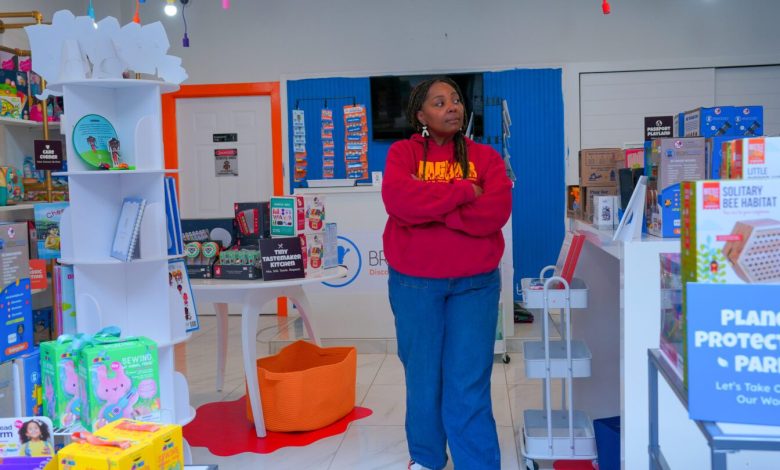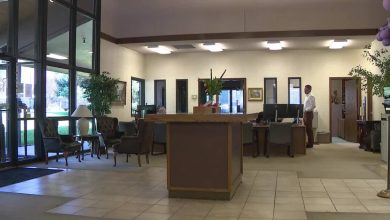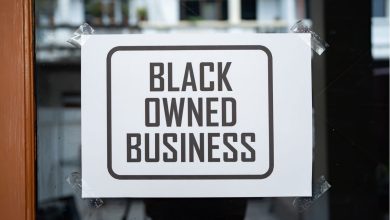Black business owners reflect on how tariffs have impacted them – WABE

Atlanta entrepreneurs continue to explore ways to manage rising material costs as tariffs put a strain on Black-owned small businesses.
Brian Reynolds owns Just for Teens, a skincare company.
“I’m in Asia right now, I’m meeting with four or five different factories. And then also I’m comparing prices,” said Reynolds.
He’s traveling through Malaysia to negotiate and strengthen relationships with suppliers from around the world, including China.

Terri-Nichelle Bradley owns Brown Toy Box, an educational toy store located in downtown Atlanta. She says almost all of the products she sells are subject to tariffs. (Matthew Pearson/WABE)
“We’re trying to look at what is the best quality at the lowest price so that we can pass that value on to the consumer,” he said.
Almost all of Reynolds’ products are made in the US, except for the Just for Teens pimple patch line, which is manufactured in Malaysia to keep costs manageable.
“We also have some options to make them in Mexico, but it’s next to impossible to make those same products in the USA at the price point that we want to make them,” said Reynolds.
Many Black entrepreneurs here have utilized support from the Russell Innovation Center for Entrepreneurs to navigate the volatility of this administration’s tariff policies.
“I know for a fact that there are other small businesses who left their products at the port because it was so expensive and they just didn’t have the money to actually bring it in from the port.”
Val Barnett, president of Emmerse and mental health advocate
Still, some say they are experiencing pain points amid this trade war.
“It most definitely created a cashflow issue if I’m being 100% honest about it,” said Val Barnett, whose business, Emmerse, sells candles, body butters, and soaps that promote mental health.
According to The Annie E. Casey Foundation, Black business owners in Atlanta already face a wide range of barriers to economic success, including disparities in access to capital for small businesses.
The Georgia Chamber of Commerce said in its latest tariff briefing that the global import taxes will drive up material and input costs for businesses.
When tariff pauses were announced, Barnett, like many business owners, attempted to get all their materials before the import tax took effect.
“Because having to buy more and get it shipped faster wasn’t something that I originally planned on to be 100% on this, but it’s something that happened,” she said.
“The shipment and the cost is more than the product itself, almost twice as much, if not three times as much in some cases.”
Jennifer Barbosa, CEO of International Supply Partners
Barnett added that at one point, it was going to cost her an extra $1,000 just to ship the materials for her products.
“I know for a fact that there are other small businesses who left their products at the port because it was so expensive and they just didn’t have the money to actually bring it in from the port,” she said.
She eventually got her materials without raising prices for her customers, but she remains worried about what the rest of the summer will look like.
“I have an anxiety disorder. I was diagnosed with it at 15 … I just remember every day why I got into business and I allowed that to fuel me no matter what’s going on,” said Barnett.
Terri-Nichelle Bradley, owner of Brown Toy Box, an educational toy store located in downtown Atlanta, says she’s already feeling it.
“All my products are going to be subject to tariffs,” said Bradley.
Her toys promote Science, Technology, Engineering, and Mathematics, or STEM education, while ensuring kids from different backgrounds see themselves represented. Bradley says these higher costs have led her to reconsider plans for the store, including hiring new employees.

Owner Terri-Nichelle Bradley said she’s held off on hiring more employees at her Downtown Atlanta toy store due to uncertainty around tariffs. (Matthew Pearson/WABE)
“We plan to have made some new hires that we are going to hold off on. We plan, there are a lot of things that we plan that we’re absolutely trying to hold off on because we just don’t know what it’s going to look like,” she said.
Jennifer Barbosa runs International Supply Partners. She provides personal protective equipment to government agencies and businesses, such as headphones for vision-impaired workers.
“The shipment and the cost is more than the product itself, almost twice as much, if not three times as much in some cases,” said Barbosa.
She said the cost to get her products has risen by a minimum of 30% to 50% due to the tariffs. Barbosa continues to explore her supplier options and identify areas where she can save money while maintaining competitive prices for her customers.
In the meantime, Atlanta’s Black business owners await what comes next from President Donald Trump’s administration. Many remain hopeful that they will weather the trade volatility caused by tariffs.




